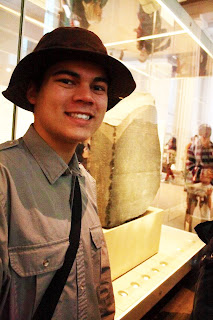I
was talking about careers with a friend recently and was expounding in much
detail about why I love economics so much, why I’m just so thrilled to be able
to have it as a major, and why I’ll hopefully be able to be working in that
field for a living eventually. It was a
good reminder to hear myself say it out loud too because I think that there is
often, especially when doing the analysis of a given reading, chart, or data
table at hand, there is a strong potential to get caught up in the numbers, the
correlations and causations, and in the causes and effects. In all that, we sometimes lose the bigger
picture, the point and purpose, if you will.
I remember as a kid I used to watch Veggie Tales videos and at the
beginning of each show, a white screen would appear and some panning footage of
a child would appear on the screen.
Accompanied with suitable background music, these words appeared on the
screen: why we do what we do. So I’d
like to take some time now to tell you, from an economist’s perspective, why we
do what we do.
Now
I’m sure I’ve defined economics in some blog post in the past, but let me
restate it in one sentence, and in the broadest sense. Economics is the study of the allocation of
scarce resources and how they can be directed to give humanity the greatest
happiness. “Economics” comes from the
Greek word “oikonomia”, which means
“the management of a household”. Think
of that, but applied to a whole region, or even the whole world. There’s a lot to be learned about the things
people do to get resources, to turn them into other products, and to then sell
them to others. There is a mind-boggling
number of connections between people all over the world. Consider this: I am wearing a shirt that was
made in El Salvador and pants from China.
I’m writing on a computer that was made in Japan and is running software
probably written by someone in California.
Mapping how all these parts of the world got together to give me the
experience I’m having right now is beyond the scope of this piece, but mapping
the global economy is one insurmountable task where the more we learn the more
we realize how little we know, and our awe increases day by day. But going back to the original question: what
is the point of economics?
Recall
that it is the study of resource allocation.
Now we recognize that resources are not always allocated as efficiently
as they could be and by extension the maximization of human happiness, is not
maximized either (to the extent that it is dependent on material goods). You would be surprised at how many things
stand in the way of efficient resource allocation and the fallacies regarding
it that pervade public discourse and governmental policy. But our work is not only to study the
resources, but to understand the people who direct their use. Economics is, in
fact, nothing short of an attempt to understand the aspect of human nature
related to the choices they make in buying and selling, saving and spending,
working and playing. Let it be known that
people are quite complex and an economist’s awe of humanity only grows as he
learns more and more. F.A. Hayek
famously said in his Nobel Prize acceptance speech that while we strive to know
more and more, we must be aware of our limitations lest we fall into the trap
of thinking that we know better than others and can rule over them. So economists ought to ultimately possess a
healthy humbleness. They ought to
realize that the end goal of our work is not to try to dictate the actions of
others, but rather to serve them. The
goal economists is to paint a picture of the world and suggest possibilities of
what can be done to make people freer, happier, and better off than they would
otherwise be without us. The desire to make the world a better place
compels us. That is why we do what we do.





